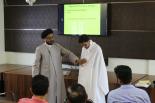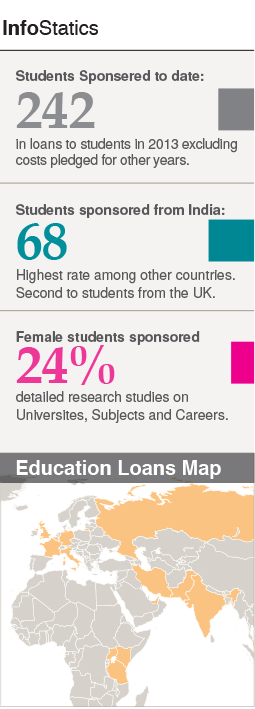The education portfolio of The World Federation of KSIMC are pleased to launch to you our recently published book; ‘The Alternatives to Our Current Higher Education Centres’ and hope you enjoy reading about the different opportunities available to our students despite the increase in tuition fees across the world.
Step 1 - “So why do you want to become a doctor?”
It’s the question you’ll be asked so many times throughout both your application to study medicine and throughout your medical education and career. So before I tell you a bit about myself and my path into medicine, as well as tips on helping you do the same, I feel it’s pivotal that this is the question we need to address first.
Whether or not you have an answer to this question now would be a good time to take a moment and really take a good look inside yourself to firstly ask whether or not medicine is the right path for you. After all, despite what some may think, it is not a particularly glamorous career. You will need to study long and hard, have to deal with some very unruly patients, not to mention an assortment of bodily fluids, and will be often confronted with stressful situations and tough decisions. These are features of medicine that any prospective student needs to consider first. If after consideration, you decide that medicine is the path for you and that you are willing to commit to being dedicated throughout your years of study and beyond, now you can ask yourself the question, “Why do you want to be a doctor?”
You may already have an answer to this question – I have heard many over the years. For some, it is a very personal reason, for others a long-standing family legacy, and for a many, the prospect of job security and satisfaction. Whatever the reason, there must be one single common feature present in all medical students and doctors: the desire to serve other people. There are many careers with job security, good pay and better hours, but none will give you the same opportunity to help improve the lives of countless individuals on a profound level. A career to me is not simply a means to put bread on the table, but something that becomes your life’s work and your legacy. For me, there was no better legacy than serving humanity for the pleasure of Allah SWT.
Step 2 – Preparing for the UCAS Application: University Selection
The first thing you need to do is decide which universities you would like to apply for. As well as looking at the location and surrounding area (e.g. local mosques and communities), it is important to look at the style of medical course that the university uses and to match this to your learning style. Some universities offer a problems-based approach (such as Brighton-Sussex Medical School), which tends to be quite practical and is focused on looking at a range of scenarios to cover core topics, as well as looking at how you might deal with individual situations. Others (such as Imperial College) tend to be more traditional, by which they organise core content by topic, starting off with the fundamental building blocks such as biochemistry and cell biology and then deals with conditions in a structured approach, covering details in a more systematic way. Some universities teach anatomy through dissection of cadavers (such as Kings’ and BSMS) whereas others implore different techniques, such as electronic resources. Many universities claim to offer an integrated approach to learning medicine, but at the end of the day it’s really up to you to investigate properly to find out which one suits you the best. Ways of doing this include:
• Looking at individual university websites
• Speaking to your college careers advice team
• Attending open days – and asking lots of questions!
• Speaking to past medical students
• Consulting online guides such as the Guardian and Telegraph University Guides
• Attending university fairs and asking questions
Of course, as well as the style of the course, many people choose universities based on their reputation and also their course requirement. As well as your one or two ‘top choices’, it’s important to pick a couple of universities where you feel you will have a better chance getting into, as places are extremely competitive wherever you apply.
Step 3 – Preparing for the UCAS Application: Work Experience and Building Your CV
Speaking about the competitiveness of places, it’s become increasingly common for students with top grades to get left without a place at uni. In some cases, this is down to a lack of work experience or other activities. A prospective medical student needs to be able to prove in his UCAS application that he is both dedicated to medicine and is a well-rounded person, who will be able to be effective in interacting with patients to provide them with optimal care. With regards to dedication, this can be proven by gaining as much work experience as possible and undertaking extracurricular activities that will enhance the skills that you will require as a doctor. Work experience can be done in a hospital or GP practice (ideally both), as well as in other places where healthcare is delivered, such as in pharmacies and nursing homes. Remember, do as much as you can. Do not be stingy with your time as it will pay off in the long run. Getting work experience is often difficult, but make sure you exert as much effort as possible to ensure you have enough, by seeking the help of your college careers service in securing work experience and well as contacting individual hospitals/GP practices etc yourself, making use of any personal contacts you may have. Once you have work experience, it is always a good idea to keep a log book or diary where you write down everything that you have seen or done, as this will prove very useful when writing your personal statement and when preparing for interviews. When on a placement, don’t be afraid to ask questions and make sure you get involved as much as possible.
In terms of demonstrating a well-rounded personality, you can so this by getting involved in a range of activities depending on your interests. Volunteer-work, charity work, sport, extra-curricular activities and hobbies all form a part of this and if you ever come across opportunities to do more, take it. The key thing to remember, though, is how each of these activities will help you in a certain aspect of your medical career and make you a more competent doctor. For example, doctors have to present patient cases to their peers at handover meetings, so any activities that involve public speaking or improving communication skills can be used to demonstrate your proficiency in this. Similarly, think about how each of your activities develops or demonstrates qualities such as leadership, teamwork, people-skills and the ability to cope with stressful situations. Communication is a particularly important one as this forms the basis of all interaction with patients, the rest of the medical team and other healthcare staff. Poor communication is a huge reason for lack of optimal patient care. If you can demonstrate these skills, this will go a mile in strengthening your overall application.
Step 4 – Preparing for the UCAS Application: Personal Statement
Another key part of your application is your personal statement. This is your one opportunity to really impress the admissions panel and show them who you really are. Remember, they are not just looking for top grades, but rather at the whole person. Being able to demonstrate how your previous experiences have enhanced your skills and how they will aid you as a practicing doctor is what forms the bread and butter of your personal statement.
This is where what was said before (in Step 3) is crucial. The same can also be said for work experience. They are not interested in the fact that you have simply done some – rather they want to know how that work experience (and other experiences) has developed you as a person and as a doctor. You should try and show how these experiences have developed your clinical understanding, taught you some principles of patient interaction and given you an insight into the true life of a doctor. That way they can be sure that you understand what it really means to be a doctor and that you are committed to making that become a reality.
Remember to include your answer to why you want to be a doctor, as well as a small section on your academic qualifications and background. Don’t waste too much space on this, though as they will already have access to your grades.
If you can, try and seek guidance from your careers advisers on your personal statement and read personal statements from people who have successfully got into medical school and identify what it is that had made them successful. A handy way of doing it is to write a draft (ignoring the word limit) with everything you wish to include – remembering to focus on how each experience has developed you. Then repeatedly go through it, cutting down anything that’s unnecessary or that is wasting space. In this period, show your personal statement to as many people as you like, seeking advice on what needs to be cut (a fresh perspective often reveals what you didn’t notice before) until you are within the character limit and left with a personal statement in which every word is contributing to making this a masterpiece. Make sure you leave yourself plenty of time before the application deadline for this as you may find that the cutting down process is a tedious one that needs a lot of thought and time. There’s not a lot of space so each word must count.
Step 5 – Entrance Exams
Given the competitive nature of med school places, most universities require some kind of entrance exam to help them differentiate between applicants. The two main exams in use are the UKCAT (UK Clinical Aptitude Test) and the BMAT (Biomedical Admissions Test). The UKCAT is designed to ascertain the cognitive ability and reasoning skills of applicants and it consists of five sections: verbal reasoning, quantitative reasoning, abstract reasoning, decision analysis and the situational judgement test. Many UK medical schools use the UKCAT as part of their application process. The BMAT, on the other hand, is only used in applications to Oxford, Cambridge, Imperial and UCL and it consists of three sections: Aptitude and skills, scientific knowledge and its applications, and a writing task that tests your ability to analyse, explore or discuss an issue. More information can be found for each of these tests on their websites. Whilst many may say that you can’t really revise for these tests, I would certainly suggest that using practice questions will put you in good stead. The importance of these should not be underestimated as the results can be decisive regarding whether or not you get that university place. Be sure to look at the websites and make sure that you register and sit the exam well before the deadline.
Good luck!
So those are my 5 steps to getting into medical school. Remember, one of the biggest things you can do to increase your chances of a successful application is beseeching Allah in Dua. Do not underestimate the effect this will have on your application, as indeed on each and every aspect of your life. I hope this information on applying to medical school has been useful and I wish you all the best in your application and your future studies.
Related News
Click here to find out about our Hajj Workshop, held in Mumbai, India on 1st July 2019.
The Hiridjee Family Student Loan is available for two female members of our Khoja community to pursue higher education. Find out more and how to apply here.











